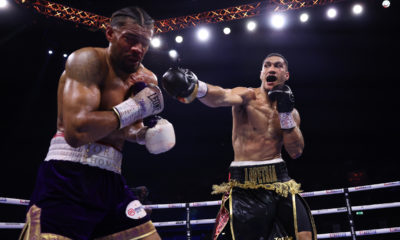
History
Boxing’s Biggest Robberies: When the Judges Got It Wrong
Boxing’s Biggest Robberies: When the Judges Got It Wrong
Boxing is often referred to as “the sweet science,” but even the most refined sciences have their flaws. Throughout history, Controversial Decisions in Boxing have shaped the sport, leading to some of the most debated outcomes in professional competition.
Controversial Decisions in Boxing and Their Lasting Impact
Controversial Decisions in Boxing
From legendary title fights to high-stakes bouts that shaped careers, questionable judging has led to accusations of incompetence, corruption, and bias. When the final bell rings, fans, analysts, and fighters alike, are sometimes left wondering: “How did the judges see it that way?”
One of the most infamous robberies in boxing history was the 1987 fight between Sugar Ray Leonard and Marvelous Marvin Hagler. Hagler, the reigning middleweight champion, appeared to outwork Leonard over 12 rounds, landing the more significant punches. However, Leonard was awarded a split-decision victory, leaving Hagler so disillusioned that he retired from boxing.
Another widely criticized decision came in 2017 when Gennady Golovkin and Canelo Álvarez faced off in a middleweight superfight. While many observers believed Golovkin had done enough to secure a win, the bout was controversially scored a draw, with judge Adalaide Byrd giving an inexplicable 118-110 card in favour of Álvarez. This decision sparked outrage and reinforced suspicions about judging bias in high-profile fights.
Bad decisions like these can have lasting effects on a fighter’s legacy and earnings. They also shake fan confidence in the sport’s credibility. While controversial fights generate heated debates and media coverage, they also highlight a major flaw in boxing—its subjective and often inconsistent scoring system. Just as in gambling, where fairness and transparency are crucial, boxing needs to ensure that decisions are made with integrity. For those interested in taking a calculated risk in another arena, checking out popular places where players can make a 1 CAD deposit could provide insights into how different industries manage fairness and trust.
The Flaws in the Current Scoring System
At the core of boxing’s judging issues is the traditional 10-point must system. Each round is scored on a scale of 10, with the winner typically receiving 10 points and the loser receiving 9 (or fewer in cases of knockdowns or dominant rounds). While the system may seem straightforward, its execution leaves plenty of room for inconsistency.
One major flaw is the subjectivity of judging. Unlike sports with clear-cut scoring (such as tennis or soccer), boxing relies on individual judges’ perceptions of factors like effective aggression, ring generalship, and clean punching. These elements can be interpreted differently from one judge to another, leading to wildly varying scorecards.
Additionally, judges are positioned ringside, meaning their perspective of the fight is limited. A fighter landing clean punches on one side of the ring may be blocked from a judge’s view, affecting scoring accuracy. The system also lacks real-time accountability, as judges do not have to justify their scores after a fight.
Another issue is the lack of oversight. Unlike in professional leagues like the NBA or NFL, where officials undergo performance reviews and suspensions for poor calls, boxing judges are rarely held accountable for bad decisions. This lack of transparency has allowed questionable judging to persist without significant reform.
The Impact of Politics and Business on Judging
Boxing is more than just a sport—it is a business. The influence of promoters, networks, and sanctioning bodies has long raised suspicions about the integrity of judging. Fighters with major promotional backing or lucrative rematch potential often seem to get the benefit of the doubt in close fights, leading many to believe that financial interests outweigh sporting fairness.
Promoters like Top Rank, Golden Boy Promotions, and Matchroom Boxing wield significant power in matchmaking and event organization. When a fighter under their banner is involved in a major fight, there is often a perception—whether justified or not—that judges will lean in their favour to protect the business interests at stake. A controversial decision that leads to a rematch can generate millions in pay-per-view revenue, making questionable outcomes financially beneficial for everyone except the fighter on the losing end.
Sanctioning bodies such as the WBC, WBA, IBF, and WBO further complicate the issue. These organizations are responsible for ranking fighters and assigning championship belts, but their selection of judges is not always transparent. Conflicts of interest arise when sanctioning bodies favour certain fighters due to financial incentives, leading to accusations of bias in officiating.
Fighters from certain regions or promotional backgrounds also appear to receive favourable treatment. Historically, fighters competing in their home countries or under certain promoters have received more lenient scorecards, reinforcing the perception that boxing is not always about who is the better fighter but rather who is the more valuable asset.
Controversial Decisions in Boxing: Should Boxing Adopt Open Scoring?
One proposed solution to boxing’s judging woes is open scoring, where judges’ scores are revealed after each round rather than being kept secret until the fight ends. This system has been tested in various boxing commissions and organizations with mixed results.
Pros of Open Scoring:
- Transparency: Fighters and fans know exactly where they stand throughout the fight, eliminating shock decisions at the final bell.
- Strategic adjustments: If a fighter knows they are behind on the cards, they can adjust their game plan accordingly.
- Reduced corruption: Open scoring discourages judges from delivering biased or inexplicable scorecards, as their work is publicly visible in real-time.
Cons of Open Scoring:
- Less drama: Boxing thrives on suspense, and revealing scores during the fight may diminish the excitement of close contests.
- Potential for stalling: A fighter who knows they are ahead may choose to coast through the later rounds, leading to less action and a less entertaining fight.
- Increased fighter pressure: Knowing they are behind could cause fighters to take reckless risks, potentially leading to unnecessary injuries.
While open scoring offers potential benefits, its implementation remains controversial. Whether it would truly fix boxing’s judging issues or simply introduce new challenges is still up for debate.
Can Technology Fix Controversial Decisions in Boxing?
As technology advances, new solutions could help eliminate human error and bias in boxing judging.
Artificial Intelligence (AI) in Scoring
AI-driven scoring systems could analyze fights using objective criteria, tracking the number of punches landed, power shots, and overall control of the ring. AI could assist judges in making more accurate decisions or even serve as an automated scoring alternative.
Instant Replay for Judges
Unlike other major sports, boxing rarely uses instant replay to review controversial moments. Implementing replay could allow judges to reassess key exchanges and correct obvious mistakes.
Wearable Sensors and Data Analytics
Equipping fighters with wearable sensors to track impact force, punch accuracy, and movement data could provide a more scientific approach to scoring, reducing reliance on human perception alone.
While technology can improve accuracy, the challenge lies in balancing tradition with innovation. Implementing AI-driven scoring may face resistance from purists who believe boxing should remain a human-judged sport.
Summing Up the Impact of Controversial Decisions in Boxing
Boxing has a long history of controversial decisions in boxing, and while bad judging will always be part of the sport, reforms can improve transparency and fairness. Open scoring, AI-assisted judging, and instant replay all offer potential solutions, but whether they will be embraced by boxing’s power players remains to be seen.
For boxing to maintain its credibility, changes must be made to ensure that when two fighters step into the ring, the rightful winner is the one whose hand is raised at the end.
Freelance Writer and Digital Marketer, spending most of his time waiting for Andy Cruz to win a world title. Also watches YouTube videos of Lennox Lewis fights on a daily basis.











